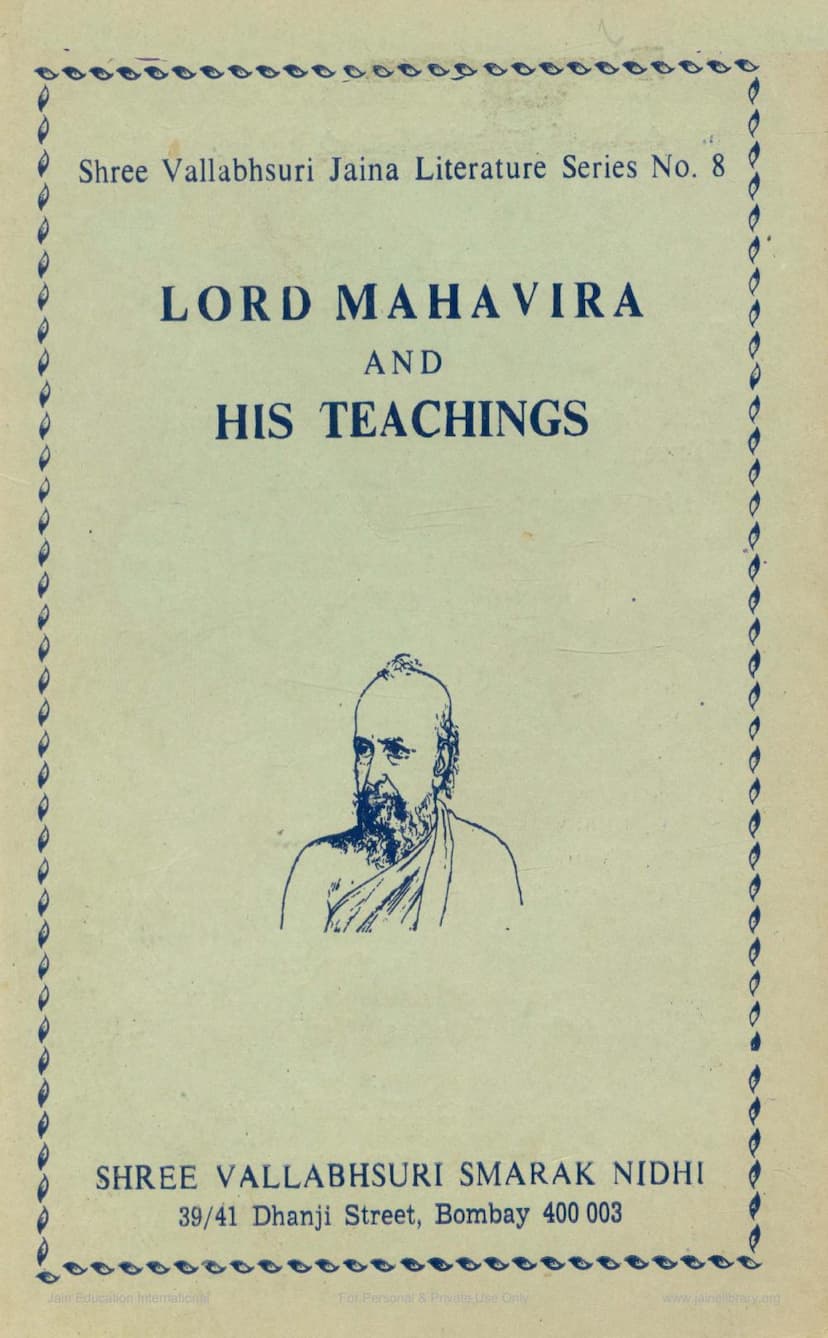Lord Mahavira And His Teachings
Added to library: September 2, 2025

Summary
This document is a compilation of essays celebrating Lord Mahavira and his teachings, published by Shree Vallabhsuri Smarak Nidhi. The book, "Lord Mahavira and His Teachings," is presented as part of the Shree Vallabhsuri Jaina Literature Series and aims to enlighten the masses about the core principles of Jainism.
Key Themes and Contents:
- Publisher's Note: The publication was initiated by Acharya Shri Vijayavallabhsuriswarji Maharaj with the goal of making Jain religious principles accessible to everyone. The book is a reprint of eight essays by acknowledged scholars, with an additional essay on Jainism's place in Indian thought. The second edition was published due to demand, indicating the utility of such publications.
- Dedication: The book is dedicated to Gulabchandji Dhaddha, founder of the Shri Jain Swotamber Conference, for his services to the Jain community and the understanding of Jain religion.
- "A Dedicated Soul": This section provides a biographical sketch of Acharya Shri Vijayavallabhasuri Maharaj, highlighting his dedication to education, social reform, and the propagation of Jain principles. It details his early life, his guru, his travels, and his significant role in founding the Shri Mahavira Jaina Vidyalaya in Bombay.
- Essays on Mahavira and Jainism: The core of the book consists of essays by various scholars, exploring different aspects of Lord Mahavira and his philosophy:
- Mahavira and His Philosophy of Life (Dr. A. N. Upadhye): This essay contrasts the Vedic religion with the ascetic traditions of the East, placing Mahavira within the latter. It discusses Mahavira's life, his renunciation, his rigorous penances, and his attainment of Kevala Jnana (omniscience). It also touches upon the significance of Vaishali, Mahavira's birthplace, and its historical and cultural importance, including its connection to Buddhism and the principles of democracy and Ahimsa.
- Lord Mahavira - An Evaluation (Dr. S. B. Deo): This essay analyzes the enduring popularity of Mahavira's teachings, attributing it to his towering personality, his reformist zeal, and his missionary patience. It highlights his rejection of caste distinctions, his expansion of Parshvanatha's fourfold dharma into the fivefold dharma (including celibacy), and his establishment of spiritual democracy.
- Lord Mahavira's Anudharmika Conduct (Shri Dalsukh Malvania): This piece focuses on Mahavira's adherence to traditional conduct ("anudharmika conduct"). It explores references in Jain scriptures that suggest Mahavira, despite his renunciation of worldly possessions, followed established traditions, such as keeping a cloth at the time of his initiation, to uphold the legacy of earlier Tirthankaras.
- Jainism and World Peace (Prof. Prithvi Raj Jain): This essay argues that Jainism's central doctrine of Ahimsa (non-violence) is the key to world peace. It emphasizes that true peace comes from goodwill and the sanctity of life, not from weapons. The essay also discusses the philosophy of Syadvada (non-absolutism) as a tool for harmonizing conflicting views and promoting tolerance, essential for peaceful coexistence. It also touches upon the importance of vegetarianism and the role of Jain ascetics in promoting peace.
- What Jainism Offers to the World (Shri C. S. Mallinath): This essay explores how Jainism provides solutions to contemporary problems such as social inequalities, economic difficulties, diseases, overpopulation, and the threat of atomic bombs. It highlights Jain principles like "all humanity is one," limited acquisition of property, charity, celibacy, and the supreme value of the soul.
- The Message of the Religion of Ahimsa (Prof. A. Chakravarti): This essay delves into Ahimsa as Jainism's central doctrine and its compatibility with scientific reasoning. It emphasizes the Jain path to salvation through Right Faith, Right Knowledge, and Right Conduct (Samyak Darshana, Samyak Jnana, Samyak Charitra). It also discusses the Jaina concept of God as a revealer of truth and the importance of the five vows (Ahimsa, Satya, Asteya, Brahmacharya, Aparigraha) for both ascetics and laypeople.
- Jainism: Its Distinctive Features and Their Impact on Our Composite Culture (Prof. Kr. De. Karnataki): This essay traces the ancient roots of Jainism and its influence on Indian culture, particularly in shaping the Brahmanical tradition. It highlights Jainism's emphasis on nivrutti (renunciation) and tapas (austerity), and how Ahimsa led to the abandonment of animal sacrifices and the adoption of vegetarianism. It also discusses the Jain contribution to speculative thought and the development of ascetic orders.
- "Choose the Great Road" (Shri B. P. Wadia): This essay reflects on the concept of voluntary incarnation of divine beings like Mahavira to help humanity. It places Mahavira and his teachings within a historical context of other great spiritual leaders of the 6th century BC, emphasizing the age's readiness for principles of harmlessness and inner light. It highlights Mahavira's emphasis on personal conduct and the daily prayer of forgiveness.
- The Place of Jainism in Indian Thoughts (Dr. Felix Valyi): This essay, originally broadcast by All India Radio, discusses the historical neglect of Jainism but asserts its profound significance for the origins of Indian thought. It positions Mahavira as a contemporary and intellectual equal of Buddha, and suggests that concepts like Ahimsa and Nirvana have Jaina origins. It also touches upon the historical existence of Jaina monastic orders predating Buddhism and the influence of Jainism on social reform and the concept of nirvana.
Overall Message:
The book collectively presents Lord Mahavira as a pivotal spiritual and ethical leader whose teachings on Ahimsa, self-control, tolerance, and universal brotherhood offer profound insights and practical solutions for individual well-being and global peace. It underscores the enduring relevance of Jain philosophy in addressing the challenges of modern life and contributing to a more harmonious and compassionate world. The publication also highlights the dedication of the Shree Vallabhsuri Smarak Nidhi and the scholars who contributed to making these teachings accessible.